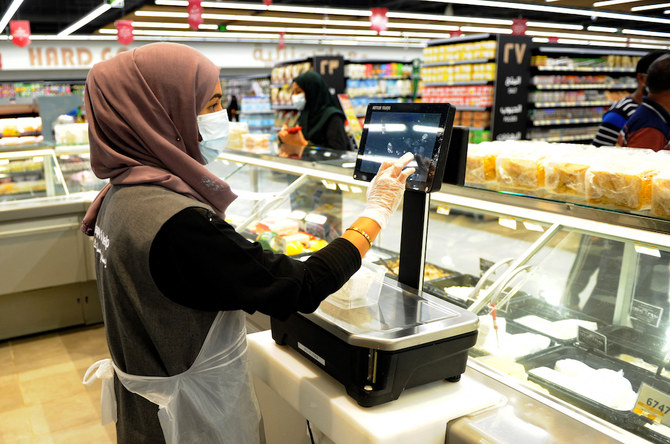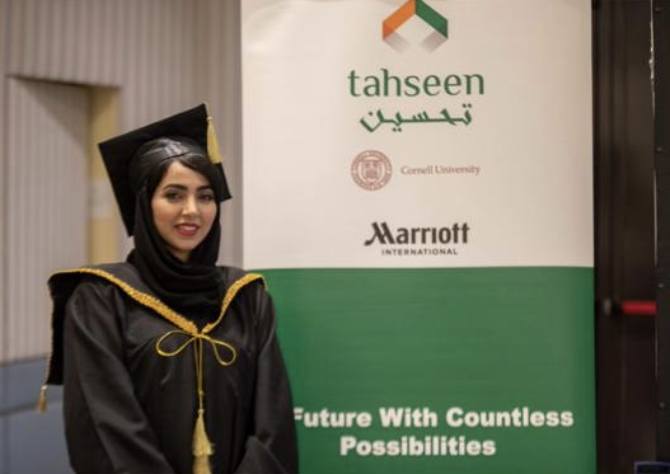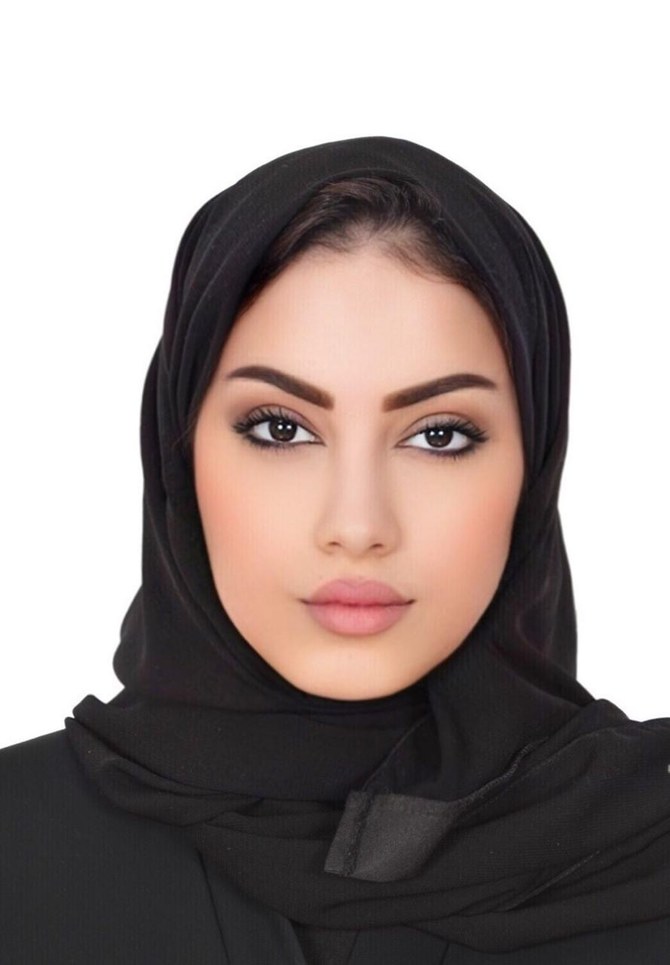RIYADH: The findings of a World Bank report about recent advances in the economic inclusion and empowerment of females in Saudi Arabia came as little surprise to the many women in the country already thriving in a wide range of jobs.
The Kingdom once again made significant progress compared with the previous year and ranks favorably alongside many advanced economies.
Women in the Kingdom who are benefiting from recent radical reforms designed to boost their participation in the workplace warmly welcomed the recognition of the country’s efforts by the World Bank’s annual Women, Business and the Law report, which this year ranked Saudi Arabia in its top tier.
“Legal reforms for women are a big part of the 2030 (Saudi) Vision and when you look at these reforms from an economic perspective, women now are moving freely, working freely, and they are now in fact likely to join the workforce more easily than before,” Kholood Khaled Althekri, a public relations manager with Pamas Group in Riyadh, told Arab News.
“These reforms will help strengthen the Kingdom’s economy for sure.”
The report places Saudi Arabia in the top tier of the 190 ranked nations with a score of 80 out of 100, compared with 70.6 last year. In allocating a score, researchers consider eight main factors: mobility, workplace, pay, entrepreneurship, pension, marriage, parenthood and assets. The Kingdom received full marks for the first five of these.
Empowering women is one of the key objectives of Saudi Arabia’s Vision 2030 reforms plan, which aims to ensure they flourish and become active leaders and innovators who can contribute fully to the growth of the economy.
“In the outlined plans of Vision 2030 to develop the economy, the same vision will provide opportunities for everyone,” Althekri said. “Saudi women are the greatest assets to these plans, with more than half of university graduates now females.”
Wafa Alghamdi, director of life improvements with Mukatafah advocacy group in Riyadh, told Arab News that women in Saudi Arabia not only now have equal economic opportunities but are increasingly playing a significant role in the financial development of the country.
“Our religion and culture gives women a special place,” she said. “Women in our society are treated and considered as an asset to their households and families — and now as an asset to our country.
“We have something called ‘feminization,’ which is the new initiative by the government to increase the participation of women in work and business to encourage them and drive the force of the economy to the fullest.”
Alghamdi said that the support of Vision 2030 has helped her make strides in her career after she entered the hospitality industry and advanced through “hard work, dedication and government support” to reach the position of head of department in a relatively short time.
“I wouldn’t have been able to make it this far without the guidance of Allah, first, and our beloved country’s push and support to be on top,” she added.
Saudi Arabia has not only introduced legal reforms to promote female empowerment but also funded projects and initiatives in a number of sectors, including tourism, investment and culture, that have created opportunities for women. Along with these initiatives, government sectors are committed to guaranteeing and protecting women’s rights in the workplace. The Ministry of Human Resources and Social Development, for example, has worked to reduce gender-based discrimination and find ways to create safe work environments that foster growth and innovation.
Women have also played their part in creating legislation, opening businesses, and taking a leading role in private-sector investment. In addition, Saudi Arabia now has its first female professional racing driver, award-winning female film producers and female judges.
It has been less than five years since Vision 2030 was announced, but already many women have become leaders in the Saudi economy, own successful businesses, manage departments in a variety of businesses, and have even attained the rank of sergeant in the military.
The World Bank report also noted Saudi initiatives that have eliminated barriers to women entering industrial jobs such as “mining, construction, manufacturing and the water sector, setting men and women on equal terms in choice of employment opportunities.”
Maha S. Albalawi, a legal counselor with Pamas Group told Arab News: “The year 2020 is considered one of the most important years in the history of Saudi women. The decisions of (the Kingdom) to empower women in a number of sectors were remarkable and very important.
“This development of empowering Saudi women took place on several levels and fields, including economically and in the field of entrepreneurship, so we find a number of Saudi businesswomen whose names are (now known) locally and internationally.”
Albalawi said legal reforms ensure the rights of women will be protected and have resulted in funding for legal action in marital disputes.
“Several court rulings have also been issued in favor of Saudi women, such as the law on protection from violence, and for Saudi women to become judges for the first time in the history of the Kingdom,” she added.
All of the women Arab News spoke with said they have had personal experience of how the changes being implemented across the Kingdom have improved their lives and career prospects.
“I still remember when I first entered the private sector, as a coordinator, and I was afraid that I could not be as good as my male colleagues,” said Alghamdi.
“As time passed I discovered that I was even better — and now I am director of life improvements, working with a group of amazing ladies who are also heads of their departments and giving their best for our community to grow.”
Saudi women welcome World Bank recognition of advances in empowerment
https://arab.news/bg2ds
Saudi women welcome World Bank recognition of advances in empowerment

- Annual Women, Business and the Law report ranks Kingdom in the top tier among 190 nations
- Saudi Arabia scored 80 out of 100
Saudi artist breaks from signature style with ‘W’ard’ exhibition

- Dammam collection running until Jan. 10 features sculpture, video and imagery
DHAHRAN: Visitors are immersing themselves in a vibrant celebration of art as Hussain Alismail unveils his compelling solo exhibition, “W’ard,” at the SASCA Art Gallery in Dammam, Saudi Arabia.
Launched on Dec. 30 last year and running until Jan. 10, the exhibition is a captivating journey through the artist’s evolving vision.

In the “W’ard” series, Alismail breaks free from his signature style, which often features bold continuous-line drawings in striking shades of black and red.
Instead, the collection showcases a rich blend of experimentation with different materials, colors and artistic techniques.
HIGHLIGHTS
• Primarily focused on drawing and painting, Hussain Alismail’s artworks delve into the intricate complexities of Saudi social dynamics.
• His works are a way to spark everyday conversations, encouraging viewers to think about the small details of human relationships and expressions.
Visitors can expect to encounter an array of fascinating works, from collages that fuse imagery, mixed media pieces with texture, three-dimensional sculptures, to dynamic video installations that spark imagination.

At the heart of Alismail’s work lies the symbol of the rose, a timeless emblem of unity that surpasses differences, inviting connection among visitors.
He said: “For this exhibition, I selected flowers to represent the unity among Saudis from different regions, reflecting the shared appreciation for Talal Maddah’s songs that gained popularity in the late 1950s and resonated with both youth and older generations.”
This cultural reference runs throughout the exhibition, highlighting the themes in Alismail’s artwork.
For this exhibition, I selected flowers to represent the unity among Saudis from different regions, reflecting the shared appreciation for Talal Maddah’s songs that gained popularity in the late 1950s and resonated with both youth and older generations.
Hussain Alismail, Saudi artist
Through his collection, Alismail creates an artistic experience that celebrates unity in the diversity of humanity.
“I see my artwork as a reflection of who I am, but once it’s out in the world, it belongs to everyone to interpret and connect with however they choose,” he told Arab News.
Alismail is not only a gifted artist, but also a committed scholar, having recently relocated to Melbourne, Australia, to pursue a master’s degree in design innovation and technology at RMIT.
His time in academia, which he describes as research-focused, has significantly influenced his art. “I’ve found these skills super useful for my art in this exhibition and they’ll definitely play a bigger role in my upcoming projects.”
Alismail holds a bachelor’s degree in fine arts in drawing and painting from OCAD University in Toronto, Canada, as well as a bachelor’s degree in creative arts in visual effects and entertainment design from Flinders University in Adelaide, Australia.
His academic background enriches his creative practice, fueling his artistic exploration.
Primarily focused on drawing and painting, Alismail delves into the intricate complexities of Saudi social dynamics.
His works are a way to spark everyday conversations, encouraging viewers to think about the small details of human relationships and expressions.
Beyond canvas and paper, Alismail’s artistic skills include photography, videography and digital graphics, allowing him to create stories that invite exploration.
“Medium serves as a platform for discovery. I constantly challenge myself to go deeper into techniques and artistic presentations,” he said.
For the exhibition, Alismail embraced a variety of innovative mediums. “I played around with 3D design, 3D printing, AI generative imagery and various other hands-on mediums,” he said.
Additionally, he aims to create a vibrant experience, expressing his desire that viewers feel “joyful and leave with a smile on their face.”
Inspired by cultural stories around him, Alismail combines personal and community tales in his art, enhancing the diverse narratives he shares.
With an eye toward revitalizing cultural connections, his work fosters an enriched understanding of our shared human experiences.
“What my audience has seen from me before is different from what I’m creating now, and I know it’ll have even more depth down the line.”
Two substations opened by Diriyah Company and Saudi Electricity Company in Riyadh

- The larger substation will support the first phase of Diriyah’s development and will be implemented through Saudi Services for Electro Mechanic Works
RIYADH: Two major electrical substations were launched at the Diriyah megaproject in Riyadh on Monday.
The substations will be operated by the Saudi Electricity Company and will speed up the development of projects in the historical area of Diriyah as well as nearby Wadi Safar.
“Today is very special to us,” Jerry Inzerillo, group CEO of Diriyah Company, told Arab News, before underlining the importance of developing infrastructure to be able to complete projects in time for Riyadh Expo 2030.

Inzerillo further elaborated on how the project requires sustainable development because it will be serving a large number of people.
The housing project “will cater to 100,000 people who will live, work, recreate, and pray with us every day,” the CEO said. “So, you need all-new, smart-city technology that the Kingdom is leading on.”
The larger substation will support the first phase of Diriyah’s development and will be implemented through Saudi Services for Electro Mechanic Works.
HIGHLIGHT
The two substations were designed in line with Diriyah’s traditional Najdi architectural style to preserve the area’s cultural identity.
The second substation, developed by the Saudi Electricity Company through Maetel contracting company, will be one of the main power sources for Wadi Safar.
This will result in a combination of the area’s natural beauty with modern infrastructure, including hospitality assets and sports facilities such as the Royal Diriyah Equestrian and Polo Club, and Wadi Safar golf course.
Also at the event, the acting CEO of SEC, Khalid Al-Ghamdi, expressed his excitement for this significant event and milestone.
“The completion of the bulk substation and the primary substation marks a new era for Diriyah, one that combines advanced infrastructure with our shared vision of creating a sustainable, world-class city,” Al-Ghamdi said.
“We are honored to work with Diriyah Company to bring power solutions that are both reliable and in harmony with Diriyah’s architectural heritage,” he added.
Diriyah is one of Saudi Arabia’s main megaprojects, supported by the Public Investment Fund. The project will eventually have homes for 100,000 people and is aiming to host millions of visits per year by 2030.
The Diriyah project alone contributes $18.6 billion directly to Saudi Arabia’s GDP and will create 178,000 job opportunities, according to the Diriyah Company.
The two substations were designed in line with Diriyah’s traditional Najdi architectural style to preserve the area’s cultural identity.
While the city is a major part of Saudi Arabia’s Vision 2030, it also has historical importance because Diryiah is the birthplace of the Kingdom of Saudi Arabia.
Saudi aid agency KSrelief sends humanitarian aid to Syria by road and air

- 60 agency trucks deliver food, shelter materials and medical supplies to meet needs of the Syrian people
- Six planes carrying aid from the Kingdom arrive at Damascus International Airport
RIYADH: Sixty trucks carrying relief supplies from Saudi Arabia crossed the Nasib Border Crossing into Syria on Monday, as part of a humanitarian effort organized by Saudi aid agency KSrelief.
The trucks contained essential supplies including food, shelter materials and medical supplies, the Saudi Press Agency reported.
Also on Monday, six planes planes carrying aid from the Kingdom arrived at Damascus International Airport.
Jordanian authorities said 600 trucks filled with aid have entered Syria through the Jordanian-Syrian Free Zone since the collapse of President Bashar Assad’s regime on Dec. 8. The director general of the zone, Irfan Khasawneh, told the Jordan News Agency that the flow of goods has remained consistent since then.
The shipments are addressing the needs of the Syrian people for essential items such as food supplies, energy equipment and spare parts for machinery, he added.
Trade is flowing smoothly, with transactions completed promptly and without delays, Khasawneh said, and staff at the zone are ready to handle larger volumes of trucks and goods in the days ahead.
Anti-extremism group Etidal helps Telegram remove 160m items of extremist content in 3 years

- Riyadh-based organization says the collaboration has had a significant effect in curbing the spread of extremist propaganda and recruitment efforts
- Platform thanks Etidal, says partnership has been instrumental in efforts to identify and remove harmful content
RIYADH: The Global Center for Combating Extremist Ideology, also known as Etidal, said on Monday that more than 31 million items of extremist content were removed from messaging service Telegram during the final quarter of 2024.
This brought the total number of such items removed from the platform since the start of their partnership in 2021 to more than 160 million, it added.
Etidal, which is based in Riyadh, said international cooperation is important in efforts to address extremist ideologies and counter the global threat posed by terrorist organizations, and that the collaboration with Telegram has had a significant effect in curbing the spread of extremist propaganda and recruitment efforts.
The platform said it has intensified its efforts to combat extremism since 2022 and expressed its appreciation for the partnership with Etidal, saying it has proved to be instrumental in efforts to identify and remove harmful content.
“There is no place for incitement to violence or terrorist propaganda on Telegram,” it added.
Etidal said it uses advanced technologies to help monitor and analyze extremist content, and detect the deceptive propaganda and tactics used by terrorist organizations in an attempt to evade content removal. It added that its efforts form part of Saudi Arabia’s broader strategy to help safeguard societies through an integrated approach, including targeted media campaigns to raise awareness of the dangers of extremism.
In addition to its partnership with Telegram, Etidal has established strategic collaborations with other international organizations. In 2021, for example, it signed a memorandum of understanding with the UN Counter-Terrorism Center.
King Faisal Prize to announce 2025 winners on Wednesday

- Selection committees start meetings to select winners in Islamic studies, Arabic language & literature, medicine and science
RIYADH: The names of the King Faisal Prize winners for 2025 will be announced on Jan. 8 in Riyadh.
Ahead of the event, specialized selection committees for the prize’s four categories — Islamic studies, Arabic language and literature, medicine and science — convened at the prize’s headquarters starting Monday, the General Secretariat of King Faisal Prize said.
Deliberations will continue through Jan. 8, it added.
The General Secretariat had previously announced the themes for the KFP 2025: Islamic studies focuses on Studies of Archaeology in the Arabian Peninsula, Arabic language and literature explores Studies of Identity in Arabic Literature, medicine highlights Cellular Therapy and Science centers on Physics.
Nominations for the prize are accepted by universities, research centers and scientific institutions, ensuring that nominees meet rigorous criteria.
Candidates must be living, and their work must already be published, intellectually impactful and beneficial to humanity’s progress. Nominations from individuals or political groups are not accepted, the secretariat said.
This year, the selection committees include prominent experts, scholars and specialists from 16 different countries. The evaluation process adheres to the highest standards of integrity.
The announcement of the winners will be made by the General Secretariat on Jan. 8 at 8:00 p.m. during a ceremony at the Prince Sultan Grand Hall in the Al-Faisaliah Center, Riyadh.
The KFP was established by the King Faisal Foundation in 1977 and was granted for the first time in 1979.
























